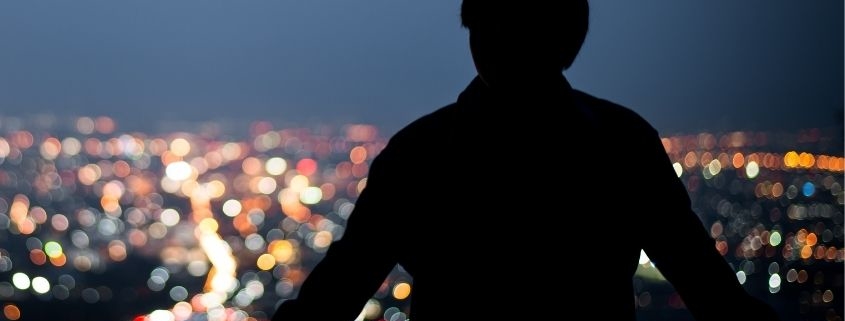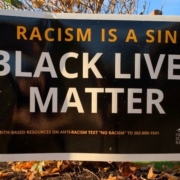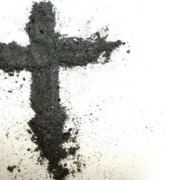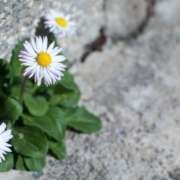Day 35: What Are We Willing to Look At?
BY JULIE SCHUMACHER COHEN | March 23, 2021
Today’s Readings

I have always appreciated reading the Psalms. The Psalmist tells it like it is, including the not-so-occasional emotional outburst. Today we hear the entreaty, “Hide not your face from me in the day of my distress…answer me speedily.” Let’s be clear: this is not about God answering our desire to win the lottery, it’s about articulating our greatest needs, hopes, and loves, and having the faith and confidence that an answer exists and will be revealed, often in unexpected ways.

In the Numbers reading, as the people of Israel were afflicted by the otherwise fatal bites of fiery serpents in the desert, an answer was unexpectedly given in the form of a bronze serpent—a Biblically cursed figure. They were to look to it for healing. To look was to live. Is deliverance, thus, bound up with coming face to face with that which is afflicted in this world, and to see this pain and brokenness not as someone else’s problem or responsibility, but as very much our own?
This Lent, as we seek reconciliation in our journey toward the Cross and the resurrection, what are we willing to look at? In the wake of the January 6 Capitol attack, many argued that that day did not reflect “who we are” as Americans. And yet, how long has the violence and virulence of racism and white supremacy plagued this nation? Will we—especially white Americans—look away?
Unity in our democracy will come by seeing and seeking the truth. So too, the pandemic will never be recovered from until we fully realize and repair the wide racial, health, educational, and economic disparities it has revealed. We are not alone in this task. The Psalmist reminds us that God looks “down from his holy height…To hear the groaning of the prisoners, to release those doomed to die.”
For Reflection:
- As part of your Lenten practice, how can you strive to not look away from the afflictions of this world, and instead, participate in God’s liberation?
Julie Schumacher Cohen is assistant vice president for community engagement and government affairs at the University of Scranton, where she focuses on community-based learning, political dialogue, refugee solidarity, and other civic engagement initiatives. Prior to Scranton, she worked for NGOs to advance peace and justice for Israelis and Palestinians. Cohen is a doctoral student in political science at Temple University and an alumna of the Ignatian Colleagues Program.









We often say « this is not who we are »
as Americans, yet history does show in racial Injustice, this is who we are.
We can participate in God’s liberation by praying for those families who were lost in Bolder, Colorado. I believe in prayer. I believe my prayers are answered. I believe I will be aware of bringing peace to every moment of my day on behalf of all those who have been horrified, hurt, killed in this week. Our liberation comes from our willingness to shed our hate and frustration on behalf of our fellow persons. Our liberation comes from our looking at all straight in the eye and accepting who they are. Our liberation comes from asking ourselves what we can do today to bring peace to the society in which we live. Our liberation occurs when we find ways to assist people who are mentally ill and have thoughts that are harmful. Our liberation come from our insistance that a person we know who expresses hurtful thoughts and actions gets help now and repeatedly. Our liberation occurs when we transform the world by asking others to pray with us for this society plagued by hurtfulness and crime. Our liberation occurs when we are generous to others who need our material help.We ask ourselves to participate in all these things with the Father, Son and Holy Spirit.
Reining in the pandemic necessitated that all of us “row together,” that we protect one another from the spread of a contagion. In the very early days, I thought that we were going to be able to do this. The most painful part of the pandemic, for me, was to learn that so many of us simply are not–yet–able to grasp this.
The vivid memory of crucifixion as a horrible way of killing kept the realistic image of Jesus on the cross out of Christians’ sight for centuries. In the early years the cross was ornamented to indicate the glory of resurrection, and such an idea persists. To link an image of a real man crucified, no matter how sanitized, with our knowledge of universal suffering and premature (as many would think) death is fitting for today’s Christians. I for one try to suggest the resurrection now after the universal torture of humanity and environment in my actively hopeful works of charity and justice.
Thus wrote Mahatma Gandhi: “All the religions of the world, while they may differ in other respects, unitedly proclaim that nothing lives in this world but Truth”.